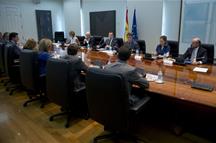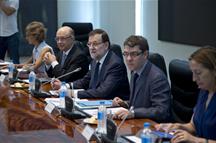The reforms carried out enable Spain to face up to the Greek crisis "calmly" and "comfortably"
President's News - 2015.6.29
1. Images of the meeting of Delegated Commission for Economic Affaires2015.6.29
Moncloa Palace, Madrid
Soraya Sáenz de Santamaría stressed that, although "we are going through troubled times" due to the Greek crisis, the situation in Spain from an economic viewpoint "is very different from the one we experienced some years ago", thanks to the structural reforms put in place in recent years. She also reminded that "Spain is a supportive country" which is open to dialogue, although she insisted that Greece ought to meet its commitments.
"We have gained competitiveness", the Government spokesperson said, which "enables us to meet a crisis of this nature calmly and comfortably and to reassure Spanish society of the absolute normality of the present situation and the way it will be handled".
The Vice-President of the Government also reported that President Rajoy has been in "continuous contact" throughout the weekend with all his economic team, the leader of the opposition, and the spokespersons of some of the main parliamentary groups. He also said that the Government continues to work with "absolute normality" in preparation of the new macroeconomic framework.
Greece continues to form part of the euro and any other situation would be far worse
During his statement the Minister of Economy and Competitiveness, Luis de Guindos, explained that the Government Committee for Economic Affairs, which met today with Mariano Rajoy in the chair, had analysed both the events that had unfolded in recent days and the scenarios that might present themselves in the coming weeks.
 Pool MoncloaAccording to Luis de Guindos, the announcement of a referendum in Greece last Friday night prompted the Eurogroup to take the decision to not extend the programme that is due to end on Tuesday. Beyond that limit, he added, "any solution would practically have to be a third programme, which would make everything far more difficult".
Pool MoncloaAccording to Luis de Guindos, the announcement of a referendum in Greece last Friday night prompted the Eurogroup to take the decision to not extend the programme that is due to end on Tuesday. Beyond that limit, he added, "any solution would practically have to be a third programme, which would make everything far more difficult".
The Minister for Economic Affairs and Competition insisted that Greece "continues to be part of the euro" and that it would be best for the country if it continued to be so. "From any point of view", he said, "the alternative would be much worse".
Luis de Guindos also stressed the effort that was made in the negotiation and the willingness to dialogue always shown by the Eurogroup and all European institutions. In this respect he maintained that "we are reaching out a hand to Greece, but Greece must also comply with some rules that are necessary if the Eurozone is to function properly and Greece is to regain confidence" and economic growth.
There is still time to reach an agreement
Regarding the referendum announced in Greece for next Sunday, Luis de Guindos commented that this decision "means a substantial change in the terms being negotiated". Nevertheless he recognized the legitimacy of the Greek government to make that decision, despite it having been made with just eight days' notice and with a great deal of uncertainty as to what will be the precise question. He also appealed to the Greek government's sense of responsibility to reconsider its position and accept "the rules that we all abide by".
He explained that "there had been a reasonable proposal from the institutions and that there was still time for the Greek government to accept it". Luis de Guindos commented that he did not see Greece exiting the euro as a "reasonable hypothesis", although he admitted that the Eurozone "is far better prepared to face up to this circumstance" than it was some years ago.
Our contingency plan for the Greek crisis are the reforms that we have put in place
With regard to Spain, the Minister for Economic Affairs and Competition stated that, "Spain's main contingency plan is having put in place reforms and being the economy that has made the most dramatic turnaround of all the major economies of the Monetary Union. That is our real contingency plan, our firewall".
 Pool MoncloaLuis de Guindos explained that Spain's situation in 2015 is not the same as it was in 2011 and 2012. Today Spain is growing at twice the rate of the Eurozone (in the second quarter of 2015 the growth rate was approximately 4%) and our banks are not generating any uncertainty, since they have passed the European Central Bank's stress tests. He added that the balance of payments is in surplus and that the Spanish economy has gained in competitiveness.
Pool MoncloaLuis de Guindos explained that Spain's situation in 2015 is not the same as it was in 2011 and 2012. Today Spain is growing at twice the rate of the Eurozone (in the second quarter of 2015 the growth rate was approximately 4%) and our banks are not generating any uncertainty, since they have passed the European Central Bank's stress tests. He added that the balance of payments is in surplus and that the Spanish economy has gained in competitiveness.
"Today is when it becomes clear that reforms are not only important from the point of view of growth and job creation, which they are, but they are also essential for overcoming circumstances that at times are difficult", the minister pointed out.
Before he finished, Luis de Guindos reminded that Spain's contribution to the Greek aid programme is 26 billion euros; he made it clear that the exposure of Spanish companies and banks is very low, which means that it was made "out of pure and simple solidarity with Greek society".





